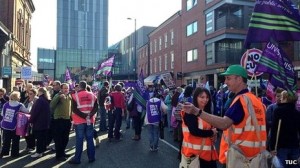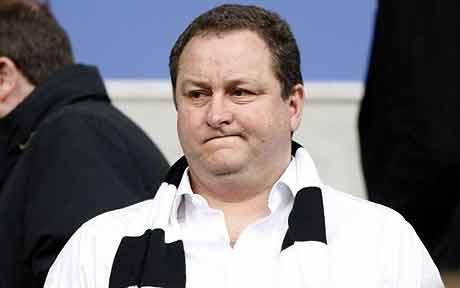My formative years as a Newcastle United supporter were the 1970’s. It is true that unlike
anybody under 50, I am fortunate enough to be able to remember us winning a major trophy, the Fairs Cup in 1969 ‘ just. However, it was the 1970’s when I first attended St James’ Park, in April 1971 to be exact, to watch a Newcastle team lead up front by new signing John Tudor and with Wyn Davies playing at right-wing (honestly!), beat West Bromwich Albion 3-0.
Slowly I graduated from sitting in the seats with my somewhat reluctant father, to standing on the Leazes End with a friend and his father in the 1973-4 season, including the famous Nottingham Forest cup-tie ‘ now THERE was a match, even if it did subsequently and ironically get wiped from the record books ‘ to standing on the Leazes End with mates from 1975 until it was pulled down in 1978. The rest of the decade’s football was watched from either the Gallowgate End or the East Paddock which was still a standing area.’ I would never claim to be the loyalest of fans, but I was one of the just over 7 000 who attended the early evening kick-off against Norwich City after we had already been relegated in 1978.
We never won a major trophy, but looking at the excellent ‘On this day in History ‘ what else?’ section on nufc.com does often bring back happy memories of matches I attended. After all we won all of the first 11 matches I went to, the run only being ended by Leeds United on Boxing Day 1973, as Slade stood at the top of the charts with ‘Merry Xmas Everybody’. I remember standing near the Gallowgate End, to join the back of the queue for the Leazes End at 12.30 for the traditional 3 p.m. kick off and 10 000 being locked out of a ground that had 55 000 inside it.
I do remember us beating a Manchester United team including George Best in 1973, a
League Cup semi-final win in 1976 and qualifying for Europe in 1977.’ and a much happier Boxing Day in 1976 when we managed to just get a 2-0 win over Sunderland finished before the snow came. The same snow was on the ground when I queued up in the bitter cold outside the Bridge Hotel to get my photograph taken and get my membership card on joining the Supporters Club, so that in January 1977, I could get on a coach to Sheffield for my first away match,a third round F.A. cup-tie at Bramall Lane.
Yes, I have many happy memories of football in the 1970’s, of Supermac and Jimmy Smith and the late Terry Hibbitt. My only regrets are that I never really saw Tony Green, only when he had a run-out in Ollie Burton’s testimopnial in May 1973 ‘ in a 2-1 defeat of Sunderland, about a week after they had won the F.A. Cup. and I would loved to have been at Hillsborough for the semi-final in 1974. Generally however,’ the 1970’s, while trophy-less were good ‘ until near the end with relegation in 1978, being accompanied by the pulling down of the Leazes and the ground becoming something of a shambles’
Indeed I think the same could be said about the 1970’s in general. They weren’t as bad a
decade as some like to make out and only started to go wrong right at the end, with the election of Thatcher in May 1979, leading to the grim years of the 1980’s.
There has been a consistent campaign to talk down the 1970’s ever since, put about by right-wing sections of the media to try and portray Thatcher as some kind of saviour of the nation. It is of course a funny kind of saviour who puts millions on the dole, causing huge suffering and destroys most of our manufacturing industry.
It is also true that 1979 saw the smallest ever gap bewteen rich and poor in this country, at the same time as trade union membership reached its all-time peak at 13 million. As I have suggested before on these pages, there might just be a link between these facts. Sure the 1970’s also saw power cuts and strikes, but the legendary ‘Winter of Discontent’ was in reality a few weeks in early 1979, which happened also to be very cold and snowy, whilst the power cuts which took place earlier in the decade only lasted a few weeks as wrell. To hear some right-wing commentators go on you would think that the 1970’s was decade of discontent with 10-year long strikes and power cuts.
It simply isn’t true. And I certainly don’t remember such poverty in the 1970’s whereby
people had to resort food banks, nor do I remember Save the Children ‘working here in what is still one of the riches countries in the world. Yet those two things are exactly what is happening in Britain today. There was poverty in the 1970’s, but there was a warmth as well, which sometimes seems to be lacking today. A cold wind has blown through Britain since 1979′.Meanwhile the fat cats have been able to keep warm having got considerably plumper in the last 34 years.
Speaking of keeping warm, the spectre of power cuts was shamefully raised again this week, of course by the fat cats of the 6 major energy companies in response to Ed Milliband’s proposal to cap energy prices for 20 months.’ Far from the usual tabloid narrative of ‘unions barons holding the country to ransom’, here we have the reality ‘ once their vast power and wealth is threatened, it is of course the fat cats who wish to hold the country to ransom. Not that you will read about that in the Daily Mail! As for ‘going back to the 1970’s’, it seems to me more like a policy to help working people today, but perhaps there is an element of a fairer, more egalitarian earlier era about it.
It was heartening to finally see Labour coming up with some interesting policies at their conference ‘ arguably for the first time in 20 years. ‘The energy policy and that of taking land from developers who are unwilling to build the homes which are desperately needed were policies were working people were being treated as the priority they should be. As for the energy company fat cats, how many will’ lose any sleep over the number of old or poor or vulnerable people who will lose their lives quietly and out of the way if we have a cold winter and they can’t afford to turn their heating up? Yes, I think you’re right’.
Hopefully Miliband can keep his nerve. The policies on issues such as energy and land must only be the start. As we await the trials in late October, of various formerly high-ranking members of Rupert Murdoch’s empire, then now perhaps now is the time for Labour to stop worrying about the right-wing tabloids and put forward more policies to end austerity and really help working people. They might just find that they are really popular.
This week of course sees the Tory conference in Manchester and on Sunday morning at 7. 30 I boarded a coach for that large North-west city. Dawn had just about broken when we left, before arriving in sunny Manchester (honestly!) , about 4 hours later. We then had to wait for what seemed like ages before we could leave the coaches as it couldn’t get parked, because there were so many’ coaches from all over the country. It has since been estimated that the number on the march was a hugely impressive 50 000. But then with misguided austerity policies biting ever more deeply into people’s incomes, an education secretary who somehow thinks it is clever to ignore almost everybody who actually works in the education field and while our NHS is under such threat, it is hardly surprising there was such a turnout.
The last issue was the main focus of the march. After more than 30 years of Tory misrule and New Labour nonsense, it is surely time to return to a politics of values. But what values?
Well, we could start by thinking of values such as compassion for the sick, for the poor, for the marginalised. It’s not as if these values are so modern or radical. You can trace them back to the Old Testament prophets, to Jesus and to others from different spiritual traditions.’ They are often called spiritual values and indeed they are, but they are also very much human values ‘ they are at the core of what makes us fully human. These ancient values should be with policy makers today. As Dr. Martin Luther King noted fifty years ago, perhaps our spiritual development has not kept pace, with our technological development.
Our recent technological and scientific developments are indeed impressive and our NHS is a good example of where the spiritual values underpinning the government’s proposals are simply not keeping up with the scientific and technological developments in medicine and surgery.
The National Health Service is 65 years old this year, but that doesn’t mean it should now be retired. It was set-up in 1948, with the intention that it would bre completely free at the point of entry with provision based on need. This provision is based on a solidarity, which is at the core of any decent, civilsed society.
Yet now we see those core values being threatened, by the government’s proposed reforms, for which, lest we forget, they have absolutely no mandate from the electorate.’ The Tories, who are pushing the reforms did NOT win the general election in 2010.
The reforms, like many in the public sector, are not driven by a desire for a better service, but rather to denigrate this particular public service and dismantle it, through privatisation. Consequently shareholder dividends and profits will take priority over patient well-being. Already, wealthy companies such as Serco have been to visit 10 Downing Street. Why could that be? How many donors to the Tory Party are going to get their reward by making money from our NHS? Why should anybody make a profit out of the illness and suffering of others?
The hugely important value of solidarity will also be threatened. It is argued that already greater inequalities are appearing as profitable services attract many at the expense of those which are unprofitable.
There is no need for a healthcare market.’ Competition over something as important as healthcare is not how we take a decent society forward. Furthermore, vital money will be wasted, used up in the administrative costs needed to set-up and run this uneccessary market. All most British people want from the NHS is that their local hospital and local G.P.’s is being well run by good professional staff and with an appropriate amount of funding. All polls on the subject suiggest that most people in Britain still believe in public services and do not want them privatised.
Newcastle United in the 1970’s were a team, who could beat anybody on their day, but didn’t do it often enough. They were a ‘nearly team’, who never quite fulfilled their potential. It was often fun watching them, but looking back there is a nagging feeling that, even before the relegation in 1978, they could have done better. We can do better now as a nation as well. A return to more egalitarian times would be welcome. Given the huge gap between rich and poor and the fact that the small economic recovery is not reaching millions of hard-working people, then we could do better. We can certainly do better with our NHS, than allow it to be carved up for already fabulously wealthy fat cats to make even more money out of the suffering and illness of others.










I often read your articles with interest and often agree with a lot of what you say. However when it comes to politics I, unlike you, have an open mind. I have helped organise trade union membership, completed a postal course on trade union history and law and on occasion voted Tory. I haven’t got time to argue all your points but you are really trying to rewrite history.
As far as NUFC is concerned have you forgotten the shame of our failure in one of the most one sided finals in FA cup history. What about Gordon Lee, Bill McGarry and the player revolt which got the inept Richard Dinnis appointed as manager. It really was a terrible period after Joe Harvey, total mismanagement and a crap ground..
As far as the political picture of the 70’s in brief.
The winter of discontent did exist as was the consequence of a left wing labour government rightly trying to control their unions. The unions really were taking the piss. Wage rise negotiations for increases of anywhere between 25% and 40%. Derek Robinson and others running their unions for political ends instead of the welfare of their members. 30,000,000 man hours lost, no petrol, rubbish piled on the streets, bodies waiting weeks to be buried and of course the power cuts putting the elderley and infirm at risk. I haven’t got time to go into the 25% inflation rate or the start of the crime boom.
Union membership peaked because companys were forced by the unions to adopt a closed shop policy resulting in people being bullied into joining or losing their jobs.
All this under a proper Labour government.
Contrary to the efforts of certain union leaders this country was still a democracy and that is why Thatcher and her tories were elected. Contrary to what you think not everyone who voted for her/them read the Daily Mail. Many union members went against the grain and vote Tory because they knew that it had to be done to save our country. Those union leaders had turned their members against them and the Labour party to such an extent that the Toriies stayed in power for 13 years. I could argue that they never lost power because Thatcher disciple Blair took over in the guise of New Labour.
I hope this version of a Tory government don’t get as long as the last but your lot once again made such an arse of it the last time, just like they did in the 70’s, that anything is possible.
By the way Milliband is saying the things you want to hear. My energy costs are fixed for over 2 years and it’s got nowt to do with him.